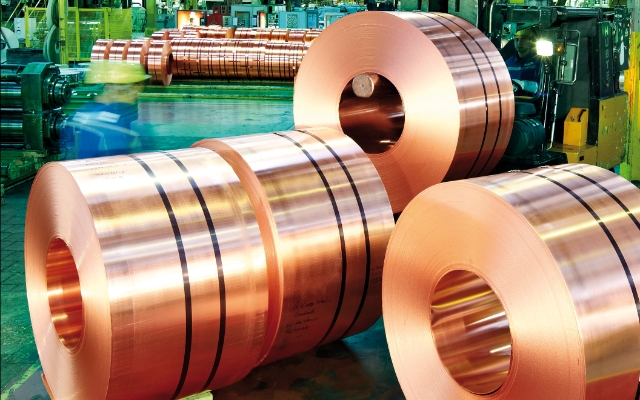Top Trends in Home Design Featuring Elegant and Practical Copper Products
Top Trends in Home Design Featuring Elegant and Practical Copper Products
Blog Article
Checking Out the Diverse Applications of Copper Products in Modern Industries
Copper items have actually established themselves as vital components across a myriad of modern industries, primarily because of their impressive conductivity, pliability, and resistance to corrosion. From enhancing the performance of electric systems to playing a crucial duty in renewable resource modern technologies, the versatility of copper is obvious. Its recyclability settings it as a sustainable option in manufacturing and electronics. As sectors increasingly focus on advancement and sustainability, the varied applications of copper call for a closer evaluation, particularly concerning their prospective impact on future technological advancements and ecological methods.
Electric Applications of Copper
Copper is a crucial product in the electrical market, making up approximately 60% of the overall demand for non-ferrous metals worldwide - Copper Products. Its superior electrical conductivity, which is nearly twice that of light weight aluminum, makes it the preferred choice for a broad range of electrical applications. From circuitry systems in residential and commercial structures to high-voltage power transmission lines, copper makes certain performance and integrity in power delivery
In addition to wiring, copper is indispensable to the manufacturing of electric elements such as transformers, generators, and electric motors. These parts utilize copper's thermal conductivity and pliability, important for warmth dissipation and reliable performance. Copper's resistance to rust enhances the life-span and longevity of electrical systems, making it an economical option in the long term.
The growth of renewable resource sources, such as solar and wind power, has actually further boosted the demand for copper in electric applications. As sectors transition towards lasting power solutions, copper's duty ends up being also extra crucial. Overall, the flexibility and efficiency attributes of copper strengthen its status as a keystone product within the electrical sector, driving advancement and performance throughout various applications.
Pipes and Piping Solutions
In contemporary plumbing systems, the option of products dramatically affects both functionality and long life. Copper has become a recommended option as a result of its special residential properties, consisting of corrosion resistance and antimicrobial attributes. These features ensure that copper piping continues to be risk-free and long lasting for delivering potable water, an essential factor to consider in household and industrial applications.
Among the crucial benefits of copper in pipes is its capability to hold up against high temperature levels and pressures, making it ideal for a selection of applications, from warm water systems to home heating and cooling networks. Furthermore, copper's flexibility allows for less complicated installation in intricate piping layouts, lowering the threat of failures and leakages.
One more noteworthy benefit is copper's lengthy life expectancy, commonly surpassing half a century with correct upkeep. This durability not just reduces replacement prices but likewise adds to sustainable methods by decreasing waste. Copper's recyclability straightens with modern ecological standards, promoting a circular economy within the plumbing market.
Copper in Renewable Power
The convenience of copper expands beyond pipes applications, playing an important role in the eco-friendly power sector. In solar panels, copper is used in photovoltaic cells and circuitry, promoting effective power conversion and transmission.

Moreover, as the global demand for electric automobiles (EVs) increases, copper's duty in battery systems and charging facilities ends up being much more substantial. The material's capability to carry out power effectively is important to the performance of EV batteries, enhancing range and charging speed.
Copper's Duty in Electronic devices
Electronic devices manufacturing depends greatly on copper's exceptional residential properties, especially its high electrical conductivity and thermal performance. These characteristics make copper an optimal choice for a large range of digital parts, consisting of adapters, circuit boards, and circuitry. The metal's capability to effectively transmit electric signals makes sure very little energy loss, which is critical in high-performance digital tools.
Moreover, copper's thermal conductivity plays a considerable role in warm dissipation, safeguarding sensitive parts from overheating. This is especially important in modern electronics, where compact styles cause enhanced warmth generation. Copper is also preferred for its pliability and ductility, allowing it to be quickly shaped right into intricate styles that satisfy the needs of sophisticated electronic applications.
With the surge of consumer electronic devices, telecommunications, and electrical automobiles, the need for copper in the electronics sector remains to expand. As advancements in innovation develop, copper stays important to attaining higher efficiency and dependability in electronic products. Its recyclability better improves its appeal, as manufacturers look for lasting options without endangering quality. Hence, copper continues to be a cornerstone material in the ever-expanding area of electronics.
Cutting-edge Uses in Production

One significant application remains in additive production, where copper-based materials are utilized in 3D printing processes. This enables for the development of lightweight parts and intricate geometries, especially in the aerospace and auto industries. Furthermore, copper's thermal conductivity makes it a perfect option for heat exchangers, improving effectiveness in commercial air conditioning systems.
Furthermore, the surge of smart manufacturing has seen the incorporation of copper in IoT gadgets, where its conductive capabilities support sophisticated picking up technologies. In the world of eco-friendly energy, copper is pivotal in the production of solar panels and wind generators, helping with a lot more reliable energy conversion and distribution.
As markets pursue sustainability and innovation, copper's convenience and performance remain to position it as an essential material, driving developments in manufacturing and contributing to the advancement of smarter, more efficient products.
Final Thought
In find more recap, copper products demonstrate remarkable versatility across different modern-day sectors. Copper Products. Their superior conductivity improves electric applications, try this web-site while rust resistance makes sure dependability in plumbing. The essential duty of copper in eco-friendly energy and its vital function in electronic devices underscore its value ahead of time lasting methods. Additionally, ingenious usages in producing highlight copper's versatility and enduring value. Collectively, these applications show copper's essential payment to technological progress and industrial effectiveness in contemporary society.
From improving the performance of electrical systems to playing a vital function in sustainable power modern technologies, the versatility of copper is evident. As sectors significantly focus on development and sustainability, the varied applications of copper necessitate a closer exam, especially regarding their possible impact on future technical developments and ecological techniques.
The growth of renewable energy sources, such as solar and wind power, has actually better enhanced the need for copper in electrical applications. Generally, the versatility and efficiency features of copper solidify its condition as a cornerstone product within the electric industry, driving technology and performance throughout different applications.
The versatility of copper prolongs past plumbing applications, playing a crucial duty in the renewable power sector.
Report this page